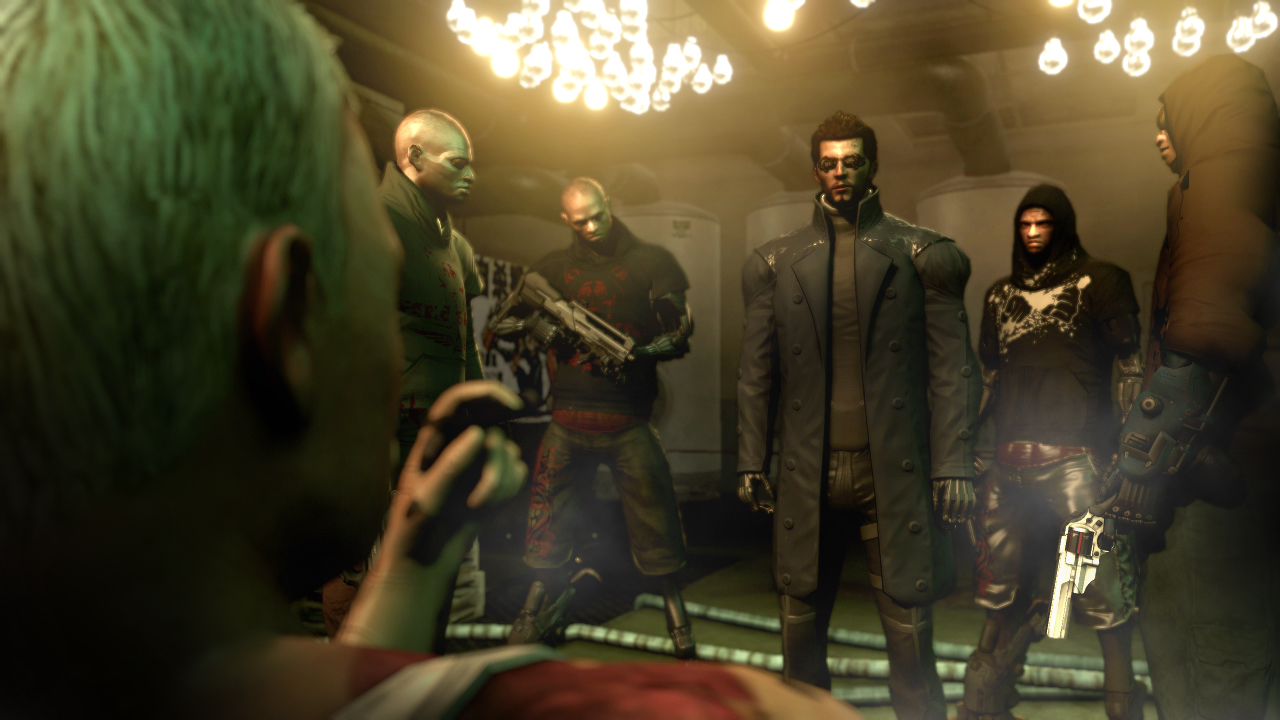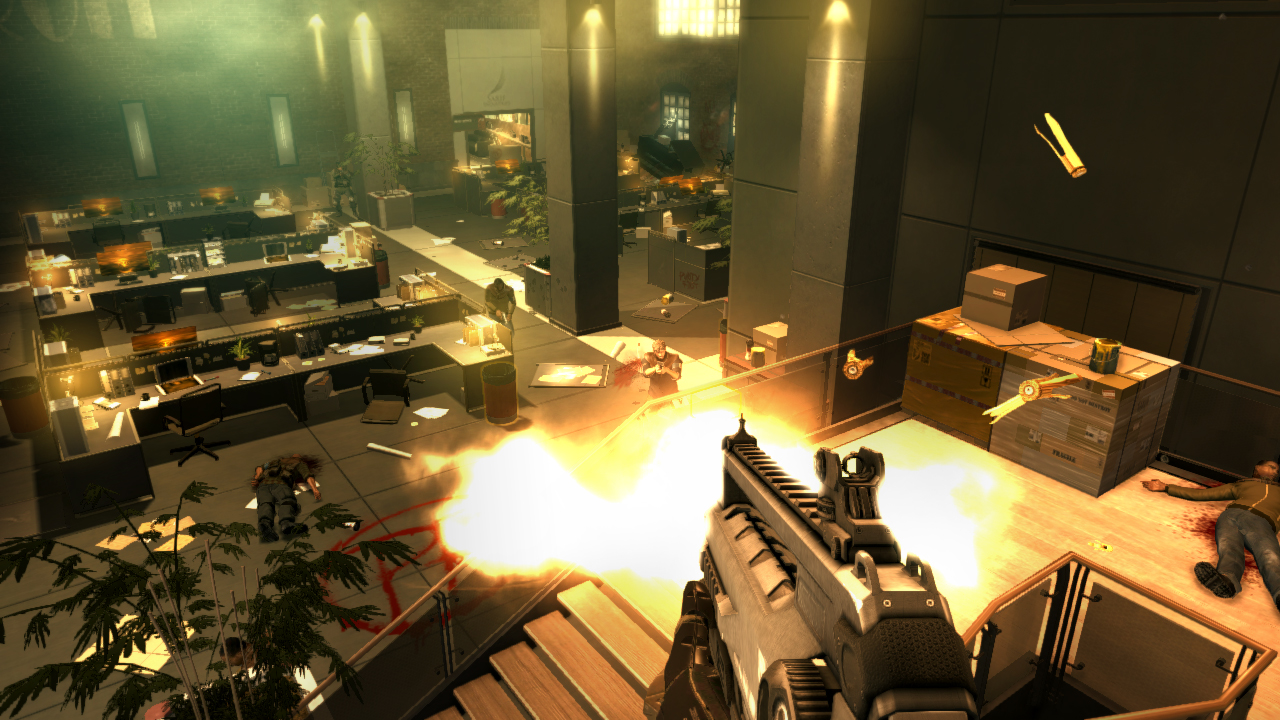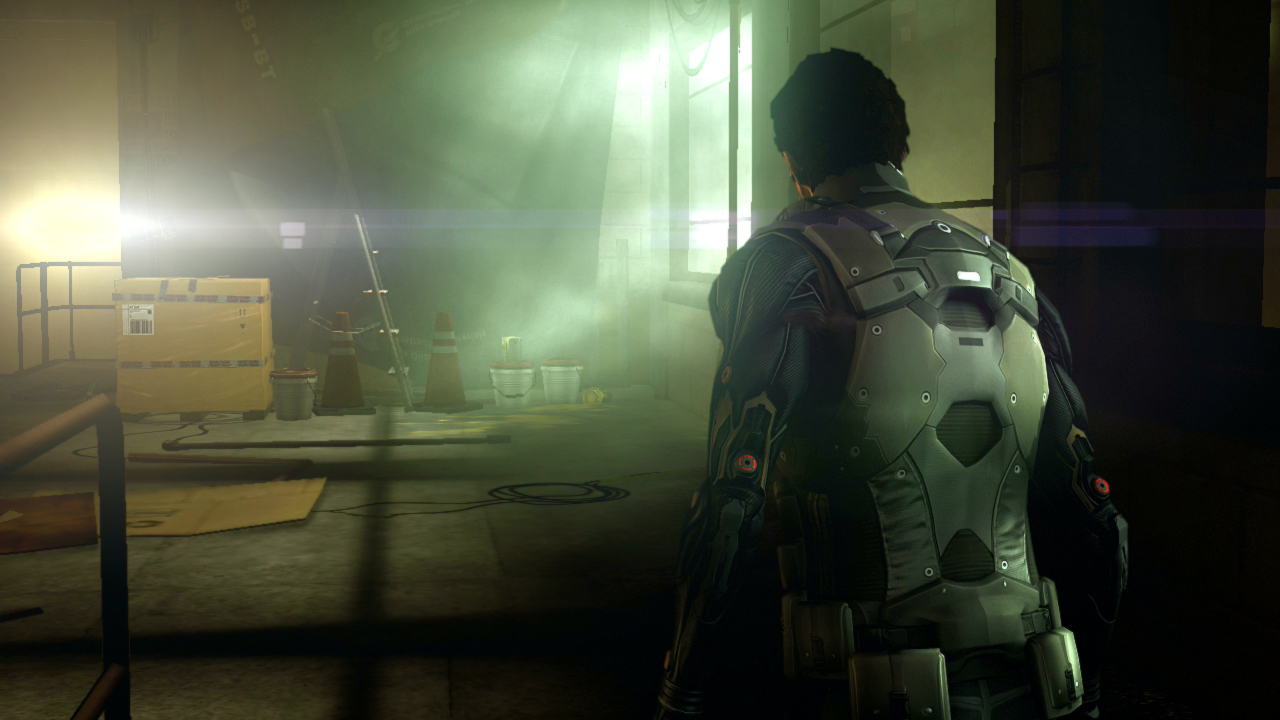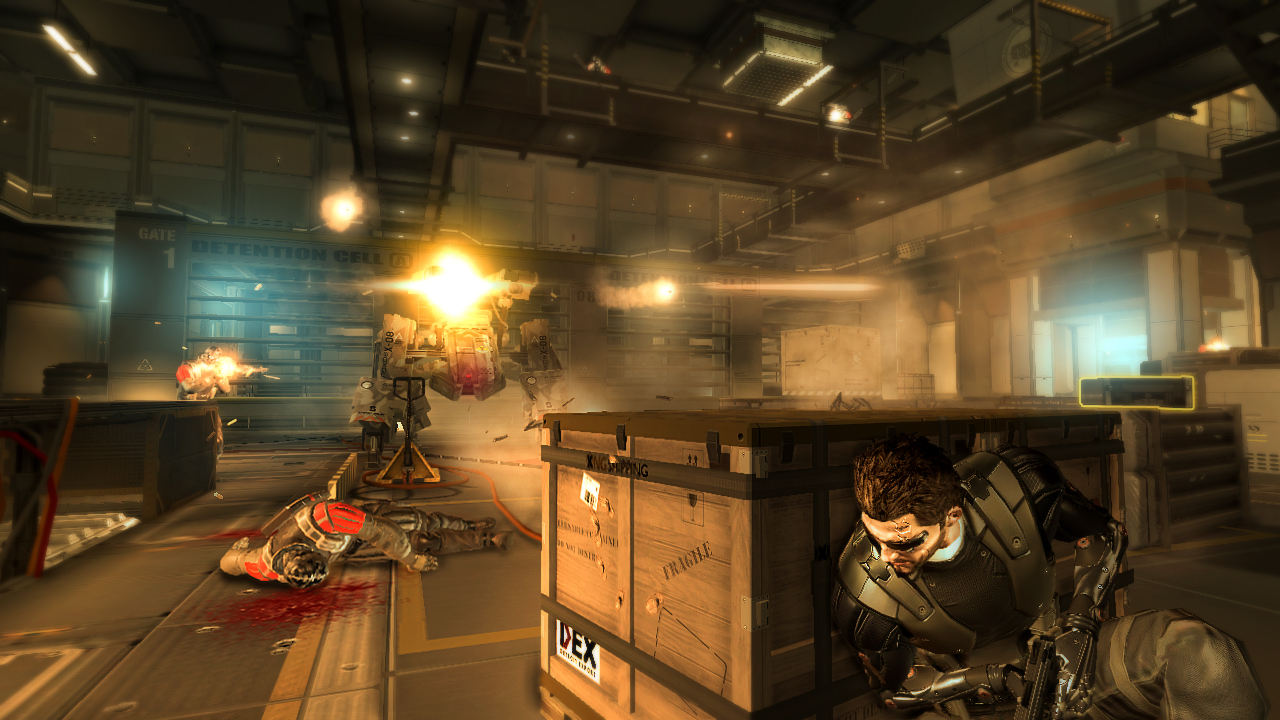“How do I play thee? Let me count the ways…”
I’ve faced down a most sinister conspiracy to be here with this review. I’ve braved seedy, dangerous nightclubs, waded through sewers, made the hard choices to kill some and spare others, and crawled through God-knows-how-many air vents. And yes, many Bothans died to bring you this information.

I’m here to tell you what I think about Deus Ex: Human Revolution—and yet, I’m conflicted over how to do so. But that conflict is, not surprisingly, the game’s own doing. Deus Ex breeds a unique mindset among its players; it has trained me to approach situations from all angles, exploring all my options (and sometimes creating new ones). But it also reminds me that those options are often mutually exclusive, that I can’t have my futuristic, nano-augmented cake and eat it too.
And that’s how it’s come to pass that I present this review with more than just my normal level-headed and occasionally verbose self. If you’ll forgive me this one narrative cliché, I essentially have a little devil and a little angel sitting on either shoulder, each vying for their own spin on the game.
The devil is blustery, headstrong, and stubborn; he’s the guy who charges in, shoots and stabs everything in sight, then stops to look at his objectives to remember why he’s in this room in the first place. The angel is quiet, patient, and always thinking ahead. Both of them had one hell of a time playing DX:HR.
“Hey,” the devil chides, “stop pontificating and tell them what you think of the damn game already.”
He’s got a point. I could go the simple, direct route. I could just say upfront, in no uncertain terms, that this game is an exceptional blend of terrific gameplay, outstanding level design, a wonderfully atmospheric soundtrack, and a well-paced, engaging, thought-provoking story—marred only by a few jarring glitches and the occasional spate of less-than-stellar voice acting from civilian NPCs.

But the angel gently taps my shoulder. “A few simple bullet points don’t do a game like this justice.”
Damn that goody two-shoes. Well then, let’s dive into the heart of a Deus Ex game—the myriad intricacies of the gameplay. Your approach to accomplishing your objectives is going to be determined mainly by how you choose to develop your skills by way of augmentation. You’ll pick up Praxis points throughout the game—by earning experience, finding hidden Praxis kits, and paying your way with credits—and use them to upgrade yourself how you see fit.
Some augmentations are meant to enhance your style of play, like combat upgrades that reduce damage taken and lessen the recoil from gunfire, or stealth upgrades that give you limited cloaking and silent movement. But others simply exist to open up different paths; immunity to electrified floors and poison gas, super-strength to move heavy objects, or heightened jumping ability to vault over fences and walls, to name a few.
“Who needs any of that crap when you can just mow down everything in your way?” the devil churns. “Take a few big guns and clear out each area, and you can just mess around at your leisure.” He pauses, lost in a rare moment of thought. “Even with combat augmentations, though, you still have to fight smart. You're still not Superman. The game has a cover system for a reason—standing out in the open trying to Rambo every bad guy is going to get you killed regardless of how badass your augmentations are.”

Exactly right, which is why a balanced approach works well on a first playthrough. Oftentimes sneaking past enemies devolves into getting spotted and fighting them off, while constantly fighting them may lead you to seek out respite in an air vent or under a desk for a breather.
The angel clears his throat. “Don’t forget about hacking and speech. Many difficult, frustrating areas can be bypassed with a high-enough hacking skill to open doors or turn robotic sentries against enemy soldiers. And let’s not forget that the incredibly cheap social augmentation will essentially let you talk your way around anybody as long as you can pay attention to blinking lights.”
Yes, the choices are all there, and it’s a testament to how superb the level design is in DX:HR that any and all of those choices are equally viable to get you through any situation. If you’re straightforward about it (I’m looking at you, devil-man) and don’t take extra time to explore every nook and cranny, you’ll probably only see about 70% of any given area. If you do start exploring, however, you’ll notice entire segments of a map that you wouldn’t have even known existed, all to provide an extra layer of options to navigate to your objective the way you want to.
All of this is punctuated by a far-reaching conspiracy story that, while not entirely free of the occasional melodramatic cliché, comes together nicely and just at the right pace to keep you interested in chasing that next breadcrumb without giving away too much information at any one juncture.

The voice acting from all the major players is generally top-notch (although David Sarif does have a penchant for going over the top), but one slight blemish comes from the NPCs in the Chinese island of Hengsha. These voice actors, whether intentional or through a miscalculation in casting, come across as definite Asian caricatures with broken English, heavy accents, and laughable intonation.
“Are you really going to nitpick over minor voice actors when you’ve got glitches to deal with?” , the devil prods me with his tiny pitchfork.
Okay, okay. If there’s one place where DX:HR falters, it’s in the glitches. Even with four years in development and a big delay already this year, I can’t help but wish that they had one more to polish it up. Graphical glitches pop up with enemies—you’ve got some occasional clipping issues with guys getting stuck in a wall; a living guard may teleport short distances for no apparent reason (this also applies to dead bodies); an NPC running around a corner may suddenly disappear. And I don’t know if it was just in my game or not, but one of my sidequests refused to give me credit for a step, effectively making it impossible to complete.
Human Revolution has multiple endings, but like the original Deus Ex, you can simply see them all on one playthrough by saving right before the end and just making a different final choice, a tactic that's disappointing and needlessly artificial. With all of the intricacies involved in the heavy decision-making that you have to do throughout the game, it doesn’t feel right that the ending you get is completely unaffected by everything else leading up to it.
One particular boss fight is made severely harder by a seemingly harmless choice made hours earlier—that’s the kind of awesome, weighty impact your decisions should have on the ending, too. Instead, you get a free pass to see every possible ending regardless of everything you did in the course of the game.

But be that as it may, Deus Ex: Human Revolution is still one of the best games of the year. It sports refined, detailed gameplay that’s tailored to the way you want to play, backed up by some of the best level design in the last decade. The glitches blemish the experience just enough that they should have warranted a little more development time, but at the end of the day, this is still a great game that no one should miss out on.
The angel looks at me and nods.
The devil folds his arms and shrugs in acceptance.
Somehow, I think they are both appeased. Now maybe they’ll shut the hell up and stop bothering me.
-
Perfectly executed choose-your-own gameplay
-
Amazing level design
-
Excellent, well-paced story
-
Great atmospheric and moody soundtrack
-
Generally solid voice acting with some spotty parts
-
A touch too many glitches
-
Endings are unaffected by the rest of the game







